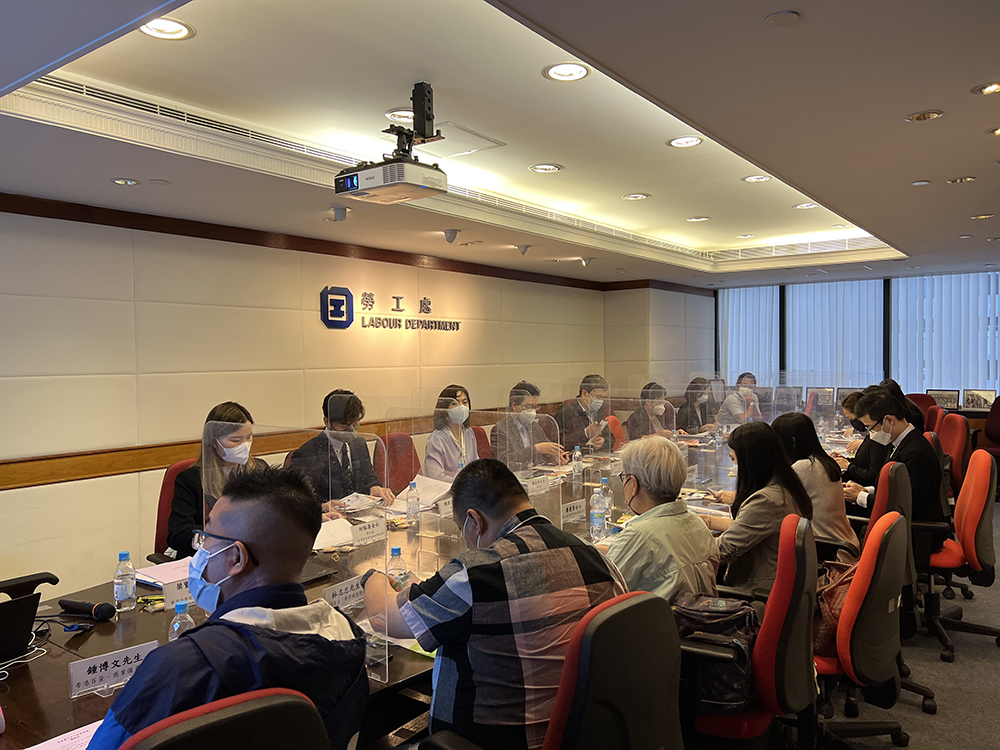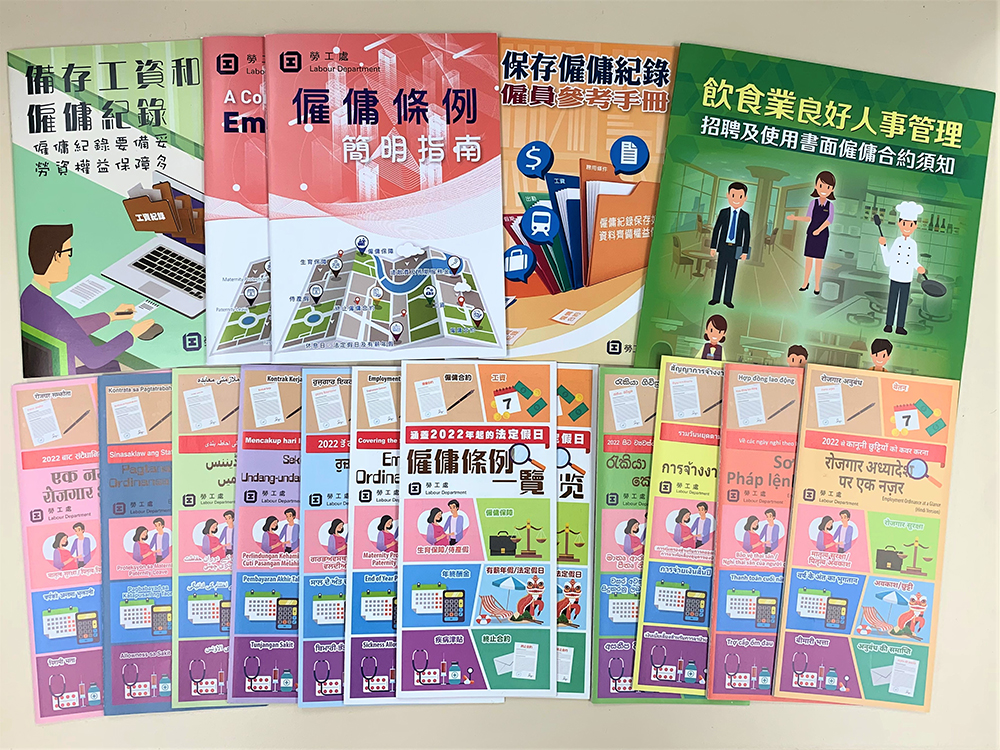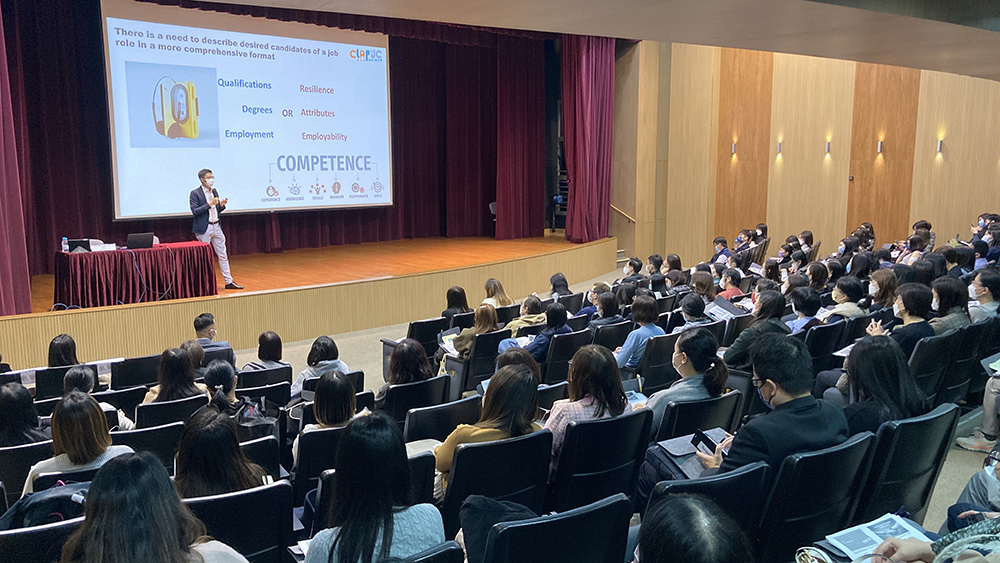Chapter 3 Labour Relations
The Programme of Labour Relations
www.labour.gov.hk/eng/labour/content.htm
3.1In Hong Kong, employer and employee relations are largely premised on the stipulations of labour laws, and the terms and conditions of employment agreed and entered into between the two parties. Employers and employees are free to form trade unions and participate in union activities. The objective of the Labour Relations Programme is to maintain and promote harmonious labour relations in establishments outside the government sector. We achieve this by:
- giving advice on matters relating to conditions of employment, requirements of relevant labour legislation, and good human resource management practices;
- providing voluntary conciliation service to help employers and employees resolve their employment claims and labour disputes;
- promoting understanding of labour laws and encouraging good human resource management practices;
- adjudicating minor employment claims speedily through the Minor Employment Claims Adjudication Board (MECAB); and
- registering trade unions and their rules, organising courses and conducting visits to trade unions to bring about sound and responsible trade union administration.
3.2The principal legislation administered by this programme area includes the Employment Ordinance (EO), the Minimum Wage Ordinance (MWO), the Labour Relations Ordinance (LRO), the Minor Employment Claims Adjudication Board Ordinance (MECABO) and the Trade Unions Ordinance (TUO).
3.3The EO sets the basic standard on the conditions of employment that establishments outside the government sector have to meet. The MWO establishes a Statutory Minimum Wage regime. The procedures for settling labour disputes in establishments outside the government sector are provided for in the LRO. The MECABO establishes the machinery known as the MECAB to adjudicate minor employment claims when settlement cannot be achieved by conciliation. For the regulation of trade unions, the TUO provides a statutory framework for trade union registration and administration.
Our Work and Achievements in 2022
Key Indicators of Work
3.4Some key indicators of work of the Labour Relations Programme Area are contained in Appendix 3.1.
Improvement to Employees’ Benefits
3.5By virtue of the Employment (Amendment) Ordinance 2021, the number of statutory holidays increased to 13 days starting from 2022, with the Birthday of the Buddha being newly-added as a statutory holiday. Besides, the Employment (Amendment) Ordinance 2022 was implemented on 17 June 2022 to strengthen the protection of the employment rights and benefits of employees when they are absent from work due to their compliance with a specific anti-epidemic requirement and encourage employees to get vaccination for COVID-19.
Conciliation and Consultation Services
3.6Our conciliation and consultation services are conducive to maintaining harmonious industrial relations in Hong Kong. In 2022, we held 45 993 consultation meetings, and handled 10 615 claims and 70 labour disputes. Over 70% of cases with conciliation service rendered were settled in the year. (Appendices 3.2, 3.3, 3.4, 3.5, 3.6 and 3.7)
Strengthening Tripartite Cooperation
3.7The Labour Department (LD) runs nine industry-based tripartite committees, covering catering, cement and concrete, construction, hotel and tourism, logistics, printing, property management, retail and theatre industries, to promote tripartite dialogue and collaboration at the industry level with a view to fostering harmonious labour relations among employers, employees and the Government. These tripartite committees provide effective forums for members to discuss issues of common concern to their industries. Employment-related matters such as good human resource management, labour relations and employment situation of the industries, sickness allowance and employment protection under anti-epidemic measures as well as abolition of MPF offsetting arrangement were deliberated in the year.

Members of an industry-based tripartite committee discussed issues of common concern to their industry at a meeting
3.8To celebrate the 25th anniversary of the establishment of the Hong Kong Special Administrative Region (HKSAR), the LD produced a TV programme “Tripartite Collaboration for a Brighter Future” to showcase the commitment of the Government, employees and employers in fostering harmonious labour relations and improving employees’ rights and benefits through tripartite collaboration since the establishment of the HKSAR. Contents were also extracted from the TV programme to produce a highlight video, a commemorative booklet and e-book for distribution through different channels.

The Labour Department produced a TV programme “Tripartite Collaboration for a Brighter Future”, complemented with a commemorative booklet and e-book, to showcase the commitment of the Government, employees and employers in fostering harmonious labour relations and improving employees’ rights and benefits through tripartite collaboration
Promotion of Good Employer-Employee Relations
3.9To enhance public understanding of the EO and to promote good human resource management culture, the LD organised various promotional activities and published free publications covering different themes for employers, employees, human resources professionals and the public. Relevant information was also disseminated through the LD’s homepage and the media. We also widely publicised messages about good human resource management as well as statutory employment rights and protection, including the progressive increase in the number of statutory holidays under the Employment (Amendment) Ordinance 2021 and the sickness allowance and employment protection under anti-epidemic measures by virtue of the Employment (Amendment) Ordinance 2022, through the extensive network of employers’ associations and trade unions. Furthermore, to promote employee-oriented and progressive good human resource management practices, we continued the Good Employer Charter initiative to encourage employers to suitably adopt family-friendly employment practices.

The Labour Department published free publications covering different themes to enhance public understanding of the Employment Ordinance and to promote good human resource management culture
3.10The LD organised experience-sharing sessions and briefings and published newsletters for members of 18 human resources managers’ clubs established in different trades. We also published newspaper articles and comic strips, and placed advertisements in public transport network and periodic journals of major employers’ associations and labour organisations to promote good human resource management. In the year, we produced a new series of radio promotion soundtracks to broadcast messages on the EO and good human resource management and uploaded the soundtracks to the LD’s website. Besides, to enhance the knowledge of ethnic minorities (EM) on the EO, promotional messages related to the EO were broadcast through four radio programmes in EM languages, while “Employment Ordinance at a Glance” and other relevant publications in EM languages were distributed through the service centres of non-government organisations.

The Labour Department organised experience-sharing sessions and briefings for members of human resources managers’ clubs established in different trades
Adjudication of Minor Employment Claims
3.11The MECAB provides a speedy, informal and less costly adjudication service for members of the public. The MECAB has jurisdiction to determine employment claims involving not more than 10 claimants for a sum not exceeding $15,000 per claimant.
3.12In 2022, the MECAB recorded 838 claims amounting to $6,213,365 and concluded 806 claims with a total award of $2,807,647.
Regulation of Trade Unions
3.13The Registry of Trade Unions (RTU) is responsible for administering the TUO and the Trade Union Registration Regulations, with a view to fostering sound trade union management and responsible trade unionism, ensuring trade unions’ compliance with the law and their respective rules. Its major areas of work include registering trade unions and their rules, examining trade unions’ annual statements of account and any other returns required by the law to be furnished to the RTU, conducting visits to trade unions and organising educational and promotional activities to enhance the understanding of trade union officials and staff on national security and trade union administration.
3.14In 2022, the RTU completed 41 registrations of new trade unions (comprising 40 trade unions and one trade union federation). As at end-2022, trade unions registered under the TUO totalled 1 469 (comprising 1 398 employee unions, 12 employer associations, 44 mixed organisations of employees and employers and 15 trade union federations). Please refer to the following webpage for the key trade union statistics: www.labour.gov.hk/eng/labour/content3.htm.
3.15In the year, the RTU examined 1 478 annual statements of account and conducted 271 visits to trade unions. The RTU organised courses and seminar to enhance the understanding of trade union officers and staff on national security, union management and trade union bookkeeping.